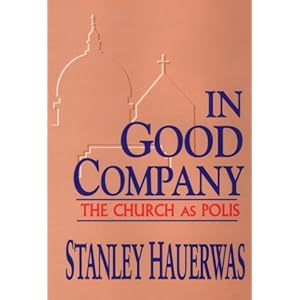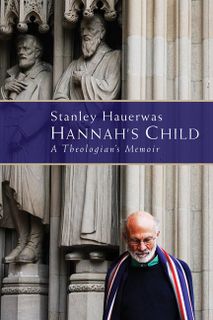 The subtitle really sums this book up well, this a book that takes on ”the outside” from a Church persepctive, at least in many of its articles. This means that there are several important texts here, such as the opening essay ”On Being a Christian and an American”, and a text on postmodernism called ”The Christian difference”. In general I would say this is one of the stronger collections.
The subtitle really sums this book up well, this a book that takes on ”the outside” from a Church persepctive, at least in many of its articles. This means that there are several important texts here, such as the opening essay ”On Being a Christian and an American”, and a text on postmodernism called ”The Christian difference”. In general I would say this is one of the stronger collections.
Another theme tha reoccurs here is Christian ethics as an academic field (there is e.g a long text on Rauschenbusch), as well as texts on Jenson, Yoder, and Rowan Greer.
A particular faviorite of mine is the fairly short text ”Sinsick” which tries to approach sin in a way that is different from the big 20th century theologians, using sickness as an analogy. This is (one of, I think) the text where Hauerwas compares students in theology with studnets in medical schools:
For example, a person can come to divinity school today saying, ”I am not really into Christology this year. I am really into relating. I would like to take more courses in CPE.” They are likely to be confirmed in that option by being told, ”Right, take CPE; after all that is what ministry is – relating. Learn to be a wounded healer.”
Contrast that with a medical student who might say, ”I am not really inte anatomy this year. I am really into people. I would like to take another course in psychiatry. ” He or she would be told, ”We do not care what you are ’into’. Take anatomy or ship our.”
This is a rather diverse collection of texts, so I guess the most valuable information here is its contents. I hope I do not break an rules by provinding that information.
- On Being a Christian and an American
- The Christian Difference: Or, Surviving Postmodernism
- Resisting Capitalism: On Marriage and Homosexuality
- Christian Ethics in America (and the Journal of Religious Ethics): A Report on a Book I will not Write
- Walter Rauschenbusch and the Saving of America
- Not Late Enough: The Divided Mind of Dignitatis Humanae Personae
- Only Theology Overcomes Ethics: Or, What ”Ethicists” Must Learn from Jenson
- Why The Politics of Jesus Is Not a Classic
- Why Time Cannot and Should Not Heal the Wounds of History, But Time Has Been and Can Be Redeemed
- Worship, Evangelism, Ethics: On Eliminating the ”And”
- Enduring: Or, How Rowan Greer Taught Me How to Read
- Captured in Time: Friendship and Aging (with Laura Yordy)
- Sinsick
- McInerny Did It: Or, Should a Pacifist Read Murder Mysteries?
That’s right people, four subtitles starting with ”Or,”. Just sayin’.

 This book collects again 13 essays (and an important introduction), most of which deal with the theme Church. In
This book collects again 13 essays (and an important introduction), most of which deal with the theme Church. In  This is a collection of texts that connect well around one theme, though one should be clear that this theme is not Bonhoeffer, but nonviolence. 9/11 raised the bets for pacifism in the US considerably and most of these essays seem to have grown out of that challange.
This is a collection of texts that connect well around one theme, though one should be clear that this theme is not Bonhoeffer, but nonviolence. 9/11 raised the bets for pacifism in the US considerably and most of these essays seem to have grown out of that challange. This is a rather loosely themed collection that deals with a number of interesting questions, centering around the theme holiness. There are essays here on themes that later have become central to Hauerwas, such as the future of the university institution. It is also interesting because Hauerwas revisits som themes from his earliest writings, such as ”character” and ”agency”.There are some solid texts on the church here as well.
This is a rather loosely themed collection that deals with a number of interesting questions, centering around the theme holiness. There are essays here on themes that later have become central to Hauerwas, such as the future of the university institution. It is also interesting because Hauerwas revisits som themes from his earliest writings, such as ”character” and ”agency”.There are some solid texts on the church here as well. Detta är ingen recension. Marcus är en god vän till mig, så det vore absurt av mig att försöka recensera hans bok. Så det här är vad jag säger om boken när någon frågar vad jag tycker om den, och jag vet att Marcus antingen hör på eller kommer att få veta vad jag sagt.
Detta är ingen recension. Marcus är en god vän till mig, så det vore absurt av mig att försöka recensera hans bok. Så det här är vad jag säger om boken när någon frågar vad jag tycker om den, och jag vet att Marcus antingen hör på eller kommer att få veta vad jag sagt. Det nya numret av den lysande svenska tidskriften NOD är delvis ägnad åt min
Det nya numret av den lysande svenska tidskriften NOD är delvis ägnad åt min  Hauerwas has dabbled with this kind of writing before, but still the beauty of this book must have been a surprise to those of us thinking that essays is all he could write. I have no doubt that this is the book that will continue to be read when all those collections of essays are out of print.
Hauerwas has dabbled with this kind of writing before, but still the beauty of this book must have been a surprise to those of us thinking that essays is all he could write. I have no doubt that this is the book that will continue to be read when all those collections of essays are out of print.



